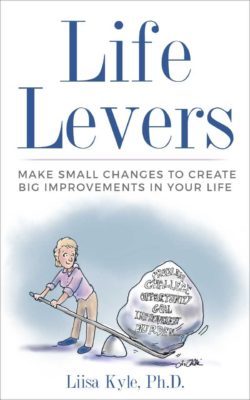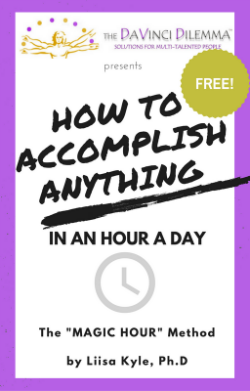To accomplish anything well, especially something you’ve never tried before, having talent helps, but other factors may be even more important.
Some time ago, I ran across a British reality TV show called Faking It. On the show, they found subjects willing to learn a new talent totally alien to their way of life and pass themselves off as experts, to experts. In this 6 minute clip, we meet punk rocker Chris Sweeney, who apprentices as a classical orchestra conductor. The resulting culture clash and transformation is funny, touching and inspiring. (Check out the video, then read on below.)
Casual viewers might think that the point of the show is that anyone can be an orchestra conductor, or that with enough chutzpah, experts can be fooled. To me it’s that even something seemingly impossible – learning the fundamentals of a difficult skill requiring artistic talent, and performing it at a competent level inside of a month – can be done with the right combination of humility, concentration, motivation and support.
This is great news and inspiration both for anyone who fears trying out a new talent, or who struggles with resistance or procrastination when faced with an intimidating new creative project or business endeavor. It doesn’t have to take forever if you’re willing to apply yourself in a certain way and allow yourself to not be perfect, just your best.
Four conditions for doing a great job at anything
Here’s what I identified as the four main ingredients of “faking it till you make it” that anyone can use, either to pursue a talent they’ve never tried, or to make massive, fast progress on any new creative project that scares them silly.
- Adopt a beginner’s mind – For the subjects of Faking It, this comes with the territory. They’ve never done this skill before. But even a master can decide to approach even something they’ve been doing for years with what Zen masters call a “beginner’s mind.” You’ll notice new distinctions and learn something instead of doing it by rote. In learning, you may discover – or rediscover— a new wonder and passion for your talent or project. And you’ll be more willing to try new things and fail along the way with panache and good humor. There’s no need for perfectionism here. After all, you’re just a beginner!
- Create laser focus– The subjects of “faking it” had a brief but intense period where they focused on nothing else except learning a new skill. The act of clearing away everything else but your project not only makes more space for it in your life, but sends your brain a message that this is Important. For DaVincis, the idea of putting everything else aside to focus on one idea or project can be excruciating, but there is a huge sense of freedom and relief once you do it. It’s a chance to go deep instead of broad, to get your dose of variety from the many intricacies of one discipline instead of skimming the surface of many. If you know it’s for a limited period, it can be a lot easier. So can having a very clearly defined finish line. It’s like training for a marathon, where the race is the culmination.
- A really strong “why”– For people on “faking it” all of Britain is watching, so there is a powerful motive to do their best. You can also set up this kind of public accountability if that works for you, by telling all your friends of your plans, or by getting an accountability buddy or coach. The most important thing is to really care about the result, and only you can determine what will motivate you. Tony Robbins and others call this “leverage.” For some people, the strongest leverage is positive, as in a vision of great success, fame, or the satisfaction of a job well done. For many, the most powerful leverage is more negative, as in avoiding the pain of embarrassment, losing money in a bet, etc. I’ve even heard of people creating accountability where if they don’t follow through they have to give money to a cause they abhor. I find that a combination of push and pull works best. When your vision is strong, compelling and exciting, you apply yourself with almost no effort. We’ve all experienced that up-all-night adrenaline that comes from pure enthusiasm. But at other times, when you’re feeling pessimistic and you can’t see yourself succeeding, knowing that you’ll have to give $100 to the NRA or to the ACLU might be enough to keep you plugging until you can find your mojo again. There is even a website called Pledgehammer where you can publicly declare your goal, its deadline, and how much money you will donate to a charity if you don’t pull it off.
- A mentor and coach – You need this for two reasons: Expert guidance, and moral support. You may actually need to engage two separate people for this, but if it can be the same person, all the better. Someone to show you the ropes and encourage you when you falter is a huge advantage when trying to accomplish anything new. This person can be a teacher or a coach, an expert in his or her field, or it can simply be someone who has done what you want to do and is just a bit further up the path than you are. Finding the right mentor is not always easy, but even the best can’t help you if you won’t accept the help. So leave the defensiveness, “I-can-do-it-myself” mentality and rigid picture of what your success should look like at the door.
Activity: Think something amazing you’d like to accomplish, either related to one of your top talents or something new that you’ve always wanted to try.
Pick an easily measurable outcome (what is your finish line?) and a deadline for completion. How could you approach this like a beginner? From whom could you learn? How could you “Act as if” rather than demanding perfection? How will you react to failures and setbacks?
How could you create laser focus? Could you opt out of some other activities for a month? How can you put some things on the back burner in a way that you’ll be comfortable with? Could you go on a short retreat?
Create leverage: What would really motivate to get your outcome? List all your positive reasons why you’d want it and what you will get from accomplishing it. Then come up with –even create– some negative consequences of not getting it. If you think accountability would help you, enlist a coach or a buddy, or announce your plans to others.
Whom could you turn to as a mentor? Who has done it already? If you don’t know anyone personally yet, you might be able to find the perfect mentor online on LinkedIn or Facebook. Model their success and take their advice. If your ideal mentor is someone you don’t know or can’t meet, you can still follow their example and get support and guidance from someone more accessible, such as a writers’ group, a trusted friend or a professional coach.
Try these tactics, and you’ll be surprised what kind of improbable progress you can make on either an old or new goal, when you set up your own life like a British reality show!
If you’d like to share or publish this article, you may, if you include the author’s name, a link to this original post and the following text blurb:
Are you struggling with too many talents, skills, ideas? You may have The Da Vinci Dilemma™! Find tools, fun quizzes, coaching, inspiration and solutions for multi-talented people at http://www.davincidilemma.com/.



